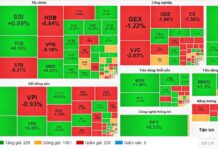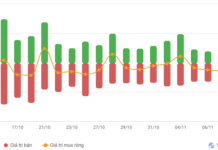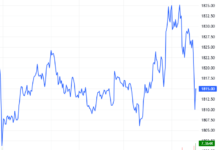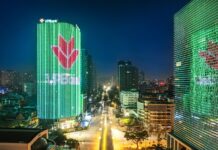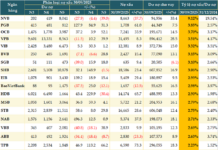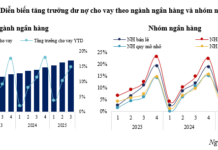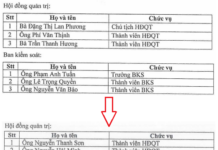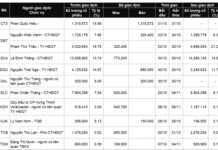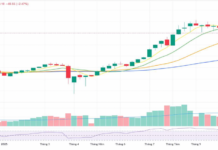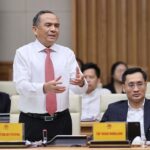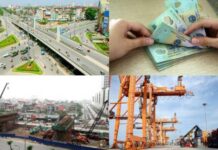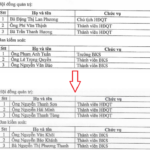It is social housing.
On the afternoon of September 22, Prime Minister Pham Minh Chinh, Head of the Central Steering Committee on Housing Policy and Real Estate Market, chaired a meeting to announce the decision to strengthen the Steering Committee and its first session. At the meeting, the Prime Minister emphasized that the real estate market and social housing development still face numerous challenges. Additionally, the housing segment remains inadequate, with products primarily focused on the high-end segment, and housing prices occasionally surging, especially in major cities.
This issue was highlighted by Prime Minister Pham Minh Chinh during the first session of the Central Steering Committee on Housing Policy and Real Estate Market.
At the session, a representative from the Ministry of Construction reported that apartment prices in Hanoi and Ho Chi Minh City remain high, with an upward trend compared to the same period last year, averaging between 70-80 million VND/m², a 5.6% increase from the beginning of the year. Meanwhile, social housing, a segment expected to help reduce housing prices, has seen improvements in quantity but remains slow compared to the set targets.
The Ministry of Construction’s report indicates that as of the end of July this year, the number of social housing units reached 59.6% of the target set in the 1 million social housing project. While some localities like Hue City and Hai Phong City have performed well, many others are still lagging and have not met their targets.
Notably, the disbursement of the 145 trillion VND loan package for social housing development remains very limited, with only over 4 trillion VND disbursed after more than 2 years.
Regarding this issue, the Prime Minister emphasized at the session: “Are there any businesses not borrowing? Are there any businesses not taking bank loans to invest in real estate? Can banks control how much of this borrowed money is used for real estate, or does it go elsewhere? Why is the bank package not being disbursed? So many people need housing, but prices are too high for them to afford. With apartment prices ranging from 70 to over 100 million VND/m², who can afford to buy?”
Why is the loan package difficult to disburse?
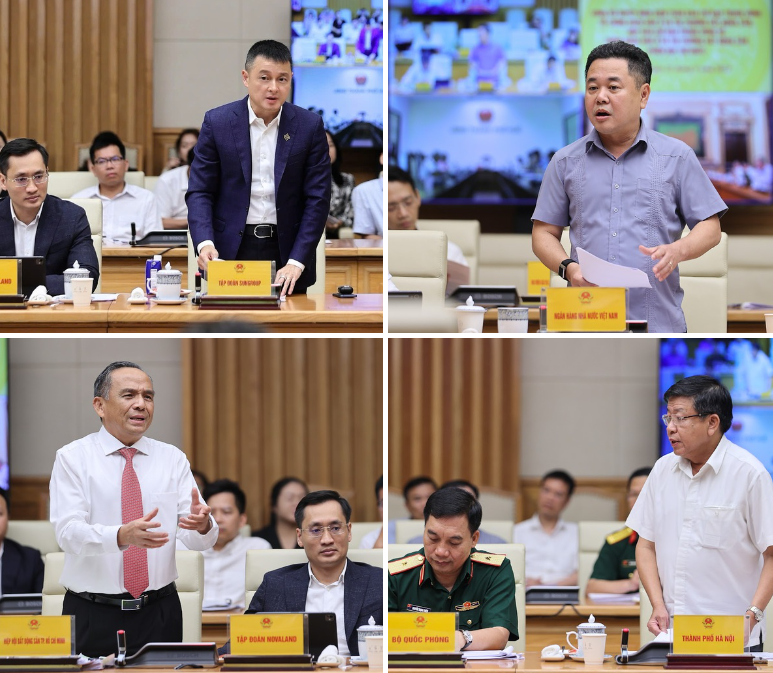
Delegates speaking at the session. Photo: VGP
Reporting at the session, a representative from the State Bank of Vietnam (SBV) stated that to date, the SBV has announced interest rate reductions six times, gradually lowering rates from 8.7%/year for developers and 8.2%/year for homebuyers at the program’s inception, to the current 6.4%/year for developers and 5.9% for homebuyers.
However, market observations reveal that both businesses and individuals face financial difficulties and seek access to bank capital, while banks assert they “have no shortage of funds.” The paradox lies in the mismatch between supply and demand. Specifically, homebuyers cannot access social housing supply, preventing them from utilizing this credit package. Meanwhile, although banks have available capital, the number of social housing projects meeting loan criteria remains low, making it difficult for banks to disburse funds.
Mr. Nguyen Ngoc Canh, Deputy Governor of the State Bank of Vietnam, noted that some real estate developers have limited financial capacity. Long-term capital mobilization channels for the real estate market, such as bonds and securities, remain underdeveloped, making real estate investment entirely dependent on credit capital. Given the long-term nature of real estate investment and the short-term nature of bank deposits, there is a liquidity risk if borrowers fail to repay on time. This poses a significant challenge.
Additionally, Mr. Tran Ngoc Anh, Deputy General Director of Viglacera, suggested an interest rate of around 5% for homebuyers. “People only buy one house in their lifetime, typically 50-70m². Some can only afford 15 million VND per month, and with a 5-year loan for both principal and interest, it becomes unmanageable,” Mr. Tran Ngoc Anh explained.
Furthermore, businesses and real estate associations argue that disbursing capital for social housing should focus on easing difficulties for homebuyers. Specifically, raising the income threshold for social housing eligibility to over 15 million VND/month would expand the number of eligible borrowers and extend loan terms.
“Amending Decree 100 on social housing to set the income threshold at 20 million VND for individuals and 40 million VND for couples is a positive step, giving us confidence in progress,” said Mr. Le Hoang Chau, Chairman of the Ho Chi Minh City Real Estate Association.
Mr. Nguyen Van Khoi, Chairman of the Vietnam Real Estate Association, analyzed that with an average income of around 15 million VND/month, some households might consider buying a home. However, with the current prevalent income of around 10 million VND/month, homeownership remains largely out of reach. The desire for stable living is increasingly urgent, yet the significant gap between income and housing prices forces many to prolong renting.
According to the Chairman of the Vietnam Real Estate Association, “No single agency can solve the entire social housing problem alone. Close coordination among the Ministry of Construction, State Bank of Vietnam, Ministry of Finance, and local authorities is essential.”
Additionally, he believes that appropriate credit policies, interest rate mechanisms, and taxes for each housing segment (commercial, mid-range, social housing) will help combat speculation and waste. Land incentives should be discussed and unified at the macro level to avoid overlaps or responsibility shifting.
Developing the Real Estate Market and Social Housing is a “National Priority”
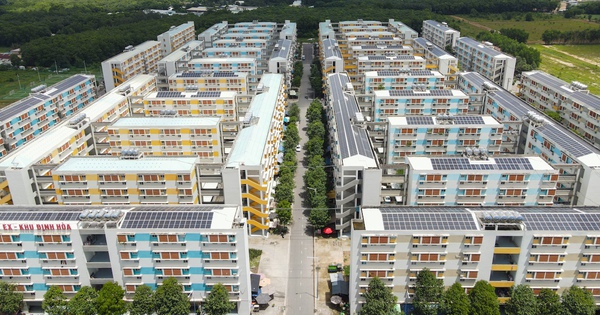
Illustrative image
According to the Prime Minister, ensuring a sufficient supply and appropriate structure of real estate, particularly social housing for low- to middle-income earners, is crucial. This is a major policy and a highly humane initiative by the State, so “it must be implemented.”
After hearing various opinions, the Prime Minister emphasized that developing the real estate market and social housing is a significant national priority, vital for the people. He stressed the need for comprehensive, inclusive, and effective solutions.
The Prime Minister directed the review and reduction of administrative procedures, promoting decentralization and empowering local authorities to “decide, act, and take responsibility.”
He also called for measures to increase supply, resolve stalled projects, promote social housing, reduce land prices, lower costs, and address infrastructure issues related to transportation, electricity, water, and telecommunications.
Regarding land prices, the Prime Minister urged enhanced state management and regulation. He instructed the Ministry of Construction to research and propose a government resolution, assigning capable and reputable businesses to implement social housing projects under principles that balance the interests of the State, citizens, and businesses.
Unveiling the Secrets Behind $100 Million per Square Meter Condo Prices
The current prices of condominiums have skyrocketed beyond the reach of not only low-income earners but also those in the upper-middle-income bracket. This staggering reality stems from developers grappling with exorbitant costs: soaring interest payments on loans, escalating soft costs, prolonged legal procedures for project approvals, hefty land-use fees, surging construction material prices, and debt moratorium policies.
Chairman of HoREA Le Hoang Chau: To Lower Housing Prices, All Costs Must Be Reduced Simultaneously, Including a Special Type of Expense
Mr. Le Hoang Chau, Chairman of the Ho Chi Minh City Real Estate Association, asserts that to effectively lower housing prices, the primary focus must be on reducing costs across the board. This includes land use fees, construction expenses, and input costs such as sand, gravel, steel, cement, electricity, and fuel. Additionally, Mr. Chau emphasizes the need to reduce a critical yet often overlooked cost: compliance expenses associated with legal and regulatory requirements.



